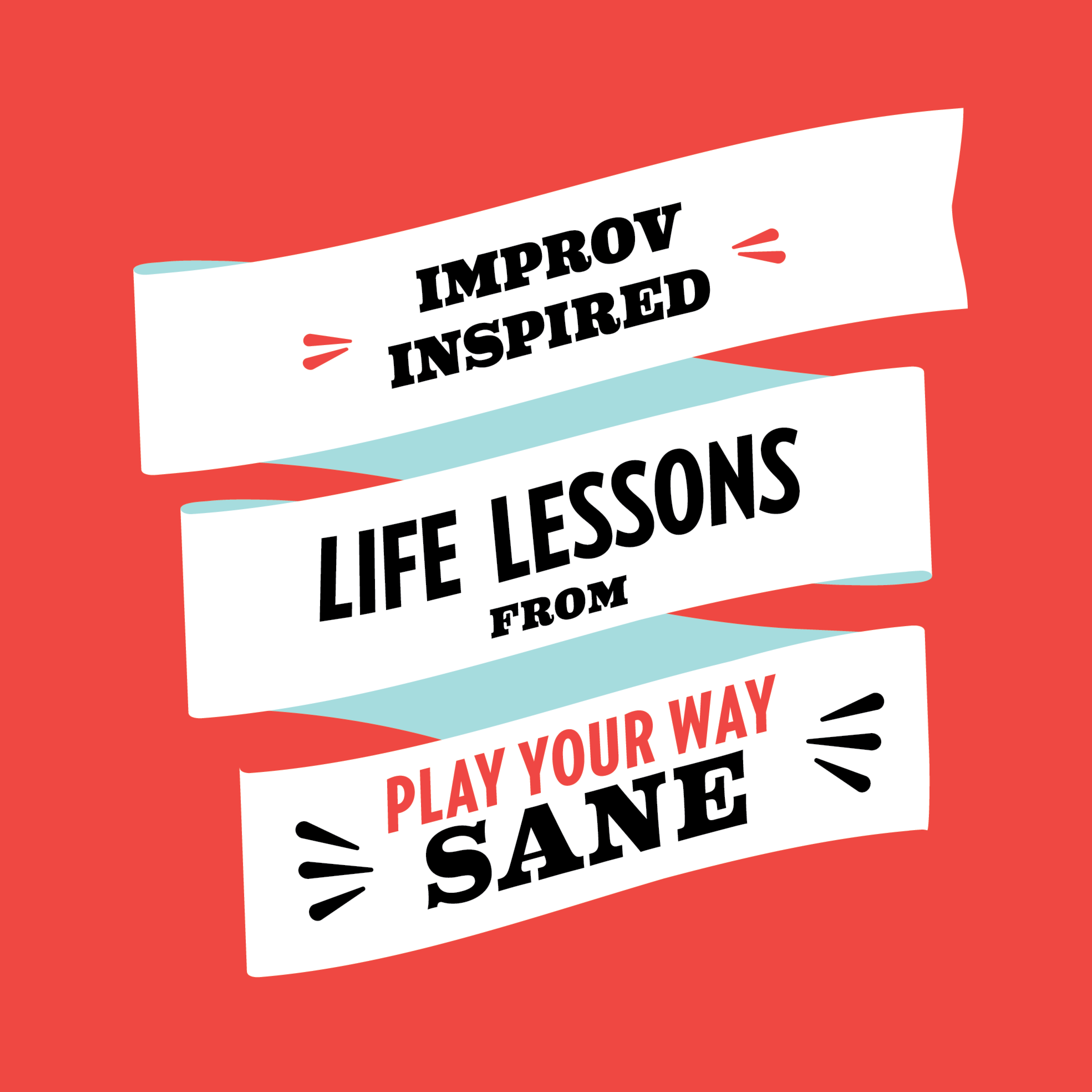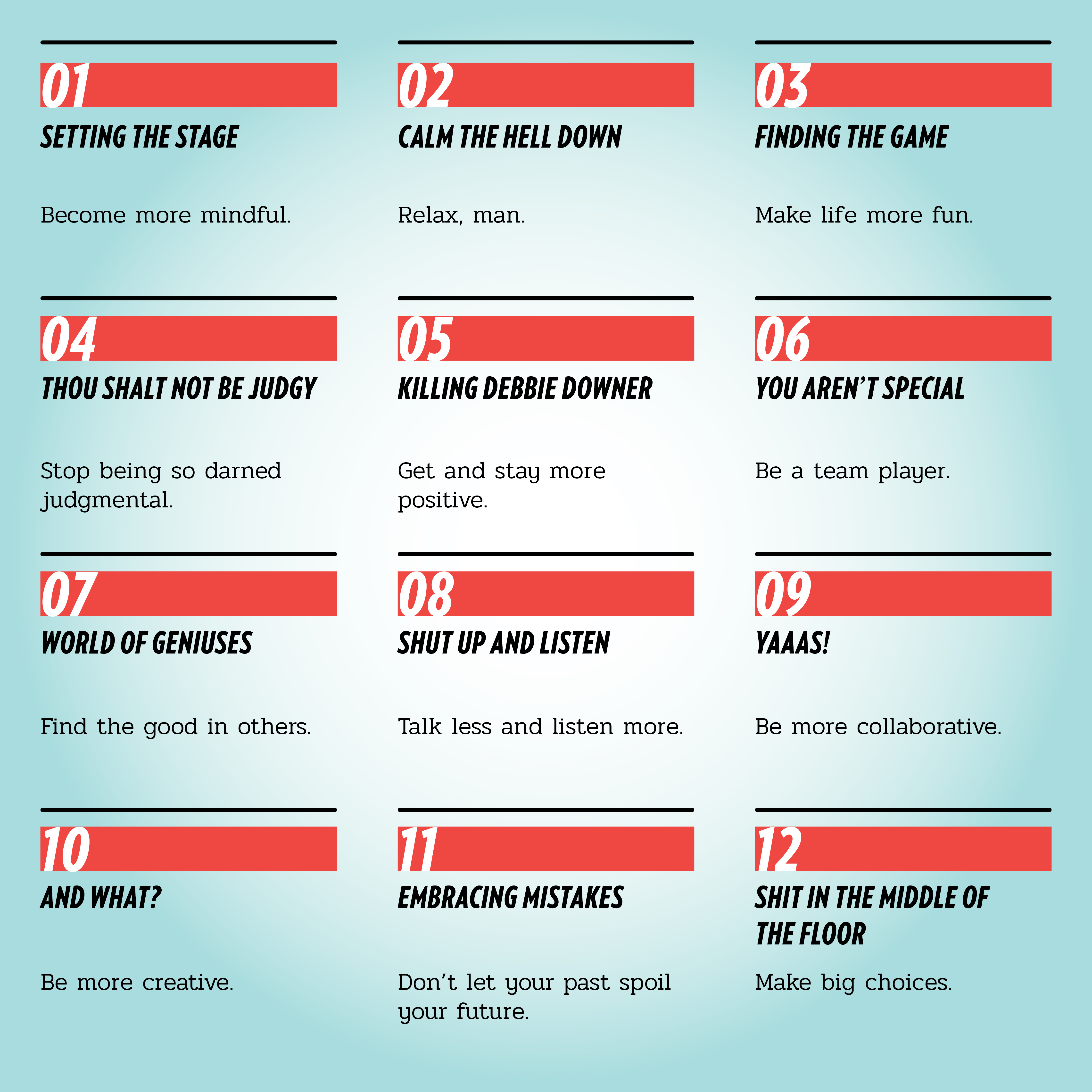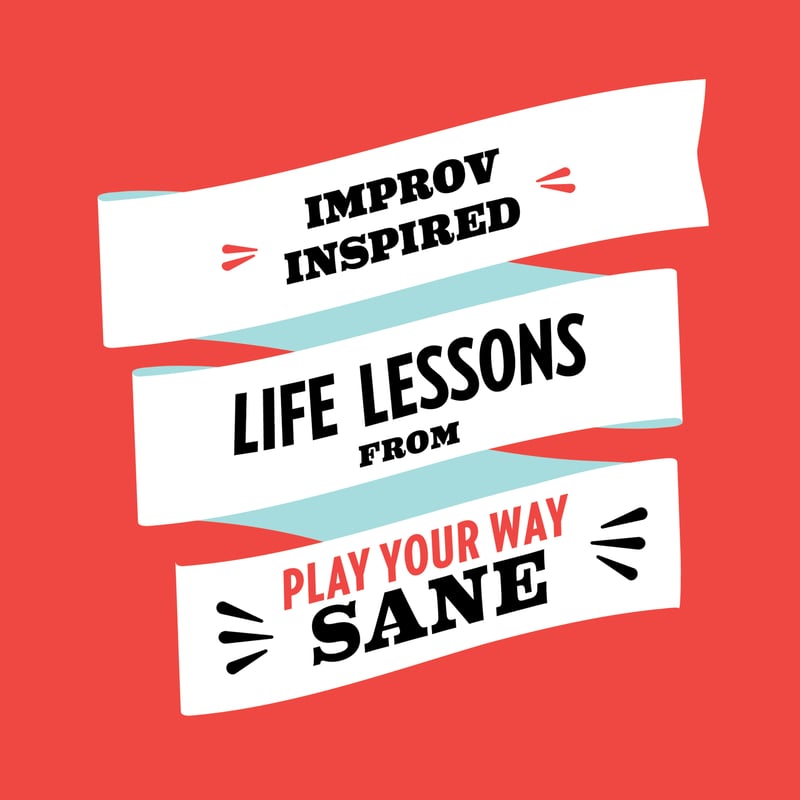
In grad school, I realized that my experience as an improviser held the key to understanding my own brain. Eventually, I realized that it also held the key to 12 lessons for life.
See, once I got the principles of improv ingrained in my lifeblood, I had this strange experience onstage. I would black out right before the show started and then start remembering again once it was over, but during the show, I was clever and quick and engaged. Even though I didn't remember, improv seemed to help my brain switch into this optimal kind of creative functioning.
This triggered a decade of research that has led me to create 12 lessons for life from improv. And now I've taken everything I'm learned about improv and its benefits to write the book Play Your Way Sane: 120 Improv-Inspired Exercises to Help You Calm Down Stop Spiraling, and Embrace Uncertainty, which contains games you can play everyday to practice the following 12 life lessons.

1. Set the Stage
Improv rehearsals often start with people clearing the stage of everything except for a few chairs. Then, improvisers usually "walk the space" and just take in the general vibe of the room, who's there and what's around them.
I love this as a metaphor for what we should be doing on the daily. We should try our best to clear our minds and be mindful of who and what surrounds us.
2. Calm the Hell Down
Part of a good improv warm-up is relaxation. In order to be able to truly listen and react to our scene partners, we have to calm our excitement, anxiety, and general jitters about performing.
Again, this rings true in real life.
Whether you're meditating, stretching, going to the gym, or taking a long walk in the woods, you need to be able to calm the hell down enough to appreciate the world as it really is.
3. Find the Game
Some improv schools emphasize finding the game much more than others. UCB is big on improvisers paying special attention to fun patterns that are emerging in a scene. It's called "finding the game" of a scene.
Imagine if we all tried to find the game in our daily lives.
To do so, simply ask what's fun about what you're currently doing. Then, you play that game.
For example, if you're talking to a friend and accidentally say their name wrong, you can create a pattern and find the game of that little accident by continuing to get their name increasingly more wrong.
Finding the game primes us to look for the fun parts of life and not focus so much on the negative. It's the sugar that helps the medicine go down.
4. Get and Stay Positive
Improvisers are also looking for ways they can add to scenes and keep them going. A negative attitude can be the death of a totally improvised scene.
Improvisers are looking for ways to help their scene partners and ways to reach their shared goal of creating something out of nothing. That requires them to have a positive attitude and focus on opportunities. If they're critical, the scene just won't work, and they certainly won't be super helpful up there on stage.
I think it's important to prime yourself to see the positive in your real life, too.
5. Thou Shalt Not Be Judgy
On a related note, improvisers absolutely cannot be judgmental or be looking for someone else's approval or disapproval.
When we are operating from a place of judgment, our brains are not able to be as creative and spontaneous. You simply can't ideate and critique at the same time. They're two separate processes that should be kept separate.
So, as much as possible, we need to limit how much we are judging other people and just let them be.
6. World of Geniuses
Improv guru Del Close once said that your fellow improvisers should be treated like the poets, artists, and geniuses they are. See, in improv, if they look good, you look good, so it makes sense to treat others like they are absolutely fantabulous.
We get what we give in real life, too. It's like the Golden Rule on crack: treat other people like geniuses, and it makes you look pretty freakin' smart yourself.
7. You Aren't Special
This is a tough pill for a lot of people to swallow. Many of us were taught that we were special, magical unicorns when we were kids. But the truth is, if all of us are special, none of us are actually special.
No person is any better or worse than any other person. We all have the same human value. If you go around thinking you have more value, that you're more special than the next guy, you're kind of a jerk.
So, stop thinking you're special and start looking for what makes others your equal.
8. Shut Up and Listen
Good improvising also relies on great listening. If I miss my scene partner's character's name or a detail about where we are, the whole scene can get off track. I have to listen super closely to incorporate my partner's details later in the scene and create a cohesive reality with them.
Real life should be like this, too.
If we pay careful attention to the people around us and try to really see and hear them, we become better friends, partners, and co-workers. Also, the more we focus on others, the less brain space we have to focus on our own anxieties, worries, and self-criticisms.
9. Yaaas
The lessons for life don't stop there. Improv keeps giving.
Perhaps the most known improv rule is the rule of agreement or Yes, And. The idea is fairly straightforward. When you say yes to your scene partner's contributions, the scene keeps going. When you say no, the scene stalls.
For example, if someone says, "Our time machine is broken," you can't say, "What time machine?" or "this isn't a time machine, idiot."
If someone does this, the scene becomes all about one reality versus another.
If the scene partner simply agrees that it's a time machine and keeps it moving, then more and more details of the world get fleshed out. The scene grows.
Much has been written about saying yes to life and to opportunities, but let me say this: I don't mean you should say yes to literally everything. I'm just saying that conversations bloom when you agree that someone else has the reality they do.
So, instead of me versus you, the Yes, And rule is a helpful reminder that when we move past conflict, our everyday life scenes can start to become more about connection. "You're wrong" shuts people down. "I see what you're saying" invites people to continue sharing and connecting.
10. And What?
The second part of Yes, And is obviously And. Improvisers can't simply agree with their scene partners and call it a day. They must also add what they call "gifts" to keep building out scenes.
Gifts are simply new details about the characters or location.
Again, life mirroring the improv stage, if we just nod our heads when we're chatting with people, we can't expect the convo to go very well. We have to add details and contribute. We have to give to receive the benefit of positive, healthy relationships.
11. Embrace Mistakes
Most of the time people write about the "rules" of improv with those scare quotes because the rule that supersedes all other rules is to embrace mistakes. Even when an onstage mistake breaks one of the other improv rules, you have to keep going and just own it and move forward. You have to justify it, which means to make it make sense in the context of the scene, just weave it into the tapestry of the scene.
This is perhaps the most important lesson we can learn from improv. Don't run away or hide from your mistakes. Embrace them. Own it and move forward. Weave them into the tapestry of your life.
12. Make Big Choices
Improvisers also have to go big or go home. To initiate or start an improvised scene or to get a flagging scene back in business, improvisers have to make big, bold choices. They have to confidently do and say things and then just go with it for all it's worth.
And it's worth a lot. Improvisers see the effects of their confident choices when scenes have specificity and vibrancy.
Let's talk about life again. Want a big, energetic, happy life? Do something. Make a change. Be bold.
It's how change happens.
Lessons for Life

Improv principles read like lessons for life. From being more positive to being less judgmental and from listening better to others to finding common ground and contributing. Just like an improviser, we have to embrace our mistakes and make big choices to jumpstart our lives.
It's also important to have the same sense of childlike play that improvisers possess. Yes, we have to adult, but there's no reason we have to do so stoically. There's no reason we can't adult while finding the game and joy of life.
That's why I've taken these 12 lessons for life from improv and created Play Your Way Sane: 120 Improv-Inspired Exercises to Help You Calm Down, Stop Spiraling, and Embrace Uncertainty. It's an irreverent take on how to use improv every day to be less anxious, overthink less, calm down, and connect better with others.
